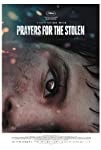Eye For Film >> Movies >> Prayers For The Stolen (2021) Film Review
Prayers For The Stolen
Reviewed by: Jennie Kermode

“You want to keep me hidden away like a worm,” protests Ana (Marya Membreño), angry once again with her mother Rita (Mayra Batalla). The two argue frequently and have done so ever since Ana was a little girl (played by Ana Cristina Ordóñez González), getting her hair chopped short on the pretext that it was infested with lice. Ana’s ordinary teenage frustrations are compounded by tremendous pressure from her mother to restrict her movements, to avoid wearing make-up, to do everything to keep from drawing attention to herself. Ana wants to express her gender, to flirt with boys, to live. Rita is desperately truing to keep her from dying.
According to experts, around 20,000 people are kidnapped by human traffickers every year in Mexico. The majority are women and girls who are forced into sex work or simply raped and murdered by the men who take them. Sometimes their corpses are dumped in the streets; more often they are simply never seen again. Mexican-Salvadorean director Tatiana Huezo knows this all too well. She’s a documentary maker with an established interest in the impact of poverty and corruption in the region. Prayers For The Stolen does not deal in statistics, however. Here the numbers remain abstract; by delving into fiction, Huezo is able to focus on the impact of this crisis on individual human lives. We see how it damages girls whether or not they themselves are taken, and how that damage resounds through the whole community.
Raising her daughter alone with her husband, like most of the younger men of the village, gone to work in some far-off place from which he may oir may not get round to sending money, Rita is always aware of the threat. In the film’s opening scene we see her digging a hole in the back yard and getting her daughter to liue down in it, to test it for size. It looks like a grave and when she rises from it, it seems as if part of Ana’s soul has been left behind. Like all kids, she’s resilient, and she still enjoys moments of high-spirited fun with her friends Maria (Blanca Itzel Pérez/Giselle Barrera Sánchez) and Paula (Camila Gaal/Alejandra Camacho), but she can never fully relax and just live; she must always keep part of her mind on the precautions necessary to avoid being killed.
Ana doesn’t fully understand all this as a young child, which provides a route in for the viewer. The women of the village try to balance the need for precautions with giving their girls some space in which to enjoy childhood. In the forest they run and play. They enjoy school, but it is getting hard to keep a teacher in the area, with protection money demanded of those who take on the role. Uneducated girls are less capable of asserting themselves. Every now and then, black SUVs drive up the dusty road that curves around the flank of the mountain. Men in expensive clothes get out and ask questions. They know which homes contain daughters. There is a sense that they are waiting for them to mature, like farmers observing young animals in the field. When the rich men come, there is little that the villagers can do to defend themselves. As if that weren’t enough, they also have to contend with crop-dusting planes which spray toxic pesticide across the mountainside at unpredictable intervals.
In the fields above the houses, opium grows. It’s critical to the village economy. Extracting the sap is far more lucrative than any other form of work. Though slow, it’s not strenuous as agricultural work goes. The bright poppies give the field a beguiling beauty. The air is fresh and clear, the view stunning – and yet rarely indulged. Huezo keeps her camera close, on faces and bent backs and blooms. One can see for miles and miles from here, and yet the desire to get away is compromised by other pressures, as it always is for peasants. All that they have is bound up in their homes, in their little patches of land. To leave would be to go into the unknown with no resources. They could find themselves preyed upon that way, too, with no community to support them.
One can look at those horrifying statistics for as long as one likes and never understand the situation in the way that Huezo makes us do here. Despite the vast expanses of valley and sky, the film is intensely claustrophobic. Rita struggles not to take out her terror and frustrated rage on her uncooperative child. Ana rages at being born into a world so palpably unjust, and urgently needs to learn that things which are not fair may still be necessary. If she is not ready, nothing else about her life, about who she is, will matter for an instant when the men come for her.
Reviewed on: 14 Jan 2022

















